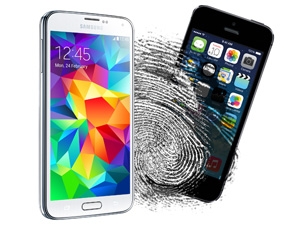A new Deloitte study revealed that smartphone users in the country are using fingerprints as passwords.
British smartphone users have adopted biometric mobile security methods to a significant degree. Deloitte released a study indicating that 20 percent of smartphone users in Great Britain authenticate using fingerprints. This suggests that the general public is becoming increasingly comfortable with the concept.
The mobile security study was conducted with the participation of 4,000 consumers across Great Britain.
The biometric mobile security study was called “There’s no place like phone.” That report determined that among the respondents, 63 percent were using PINs and passwords for mobile phone authentication. Another 21 percent were using mobile device fingerprint sensors for that purpose.
 The report stated, “We expect ownership of fingerprint readers to continue increasing rapidly.” It also added that “Many millions of people are likely to acquire a handset with a fingerprint reader over the coming year (either as a new or second-hand phone) and some people who currently have a fingerprint reader may start using it, as more apps offer this functionality.”
The report stated, “We expect ownership of fingerprint readers to continue increasing rapidly.” It also added that “Many millions of people are likely to acquire a handset with a fingerprint reader over the coming year (either as a new or second-hand phone) and some people who currently have a fingerprint reader may start using it, as more apps offer this functionality.”
The report provided a number of reasons that biometric mobile security may be stronger than other forms.
It pointed out that using fingerprint authentication technology is quick, simple and inconspicuous. Moreover, its successful completion isn’t dependent on certain ambient conditions as is the case with many other forms of biometrics. Bright sunlight, for example, doesn’t reduce the effectiveness of this method. Similarly, a noisy room won’t change the accuracy of the scan. That said, according to the report, 2 percent of participants did use facial recognition or voice recognition to authenticate.
The outcome of this study is not unlike those from a prior Visa Europe study. That research indicated that people in Great Britain feel that they can trust government agencies and banks to keep their biometric data safe. As a result, they feel that they aren’t risking unauthorized access of their biometric mobile security data.
When those consumers were asked if they would trust this type of mobile security technology to confirm their identity, 85 percent said they would trust it with their banks. Another 81 percent would trust this method with certain payment methods. Seventy percent trust global online brands with this method. Finally, 64 percent said they would use this with their smartphone companies.

 Not only will this purchase provide the company with one more step in expanding its reach into the western market, but it also reveals an interest in biometric security. That type of technology analyzes biological features that can be detected with scanners. In the case of EyeVerify, the software they produce can analyze and recognize the veins on the sclera (the visible part of the eyeball that is white inc color).
Not only will this purchase provide the company with one more step in expanding its reach into the western market, but it also reveals an interest in biometric security. That type of technology analyzes biological features that can be detected with scanners. In the case of EyeVerify, the software they produce can analyze and recognize the veins on the sclera (the visible part of the eyeball that is white inc color).